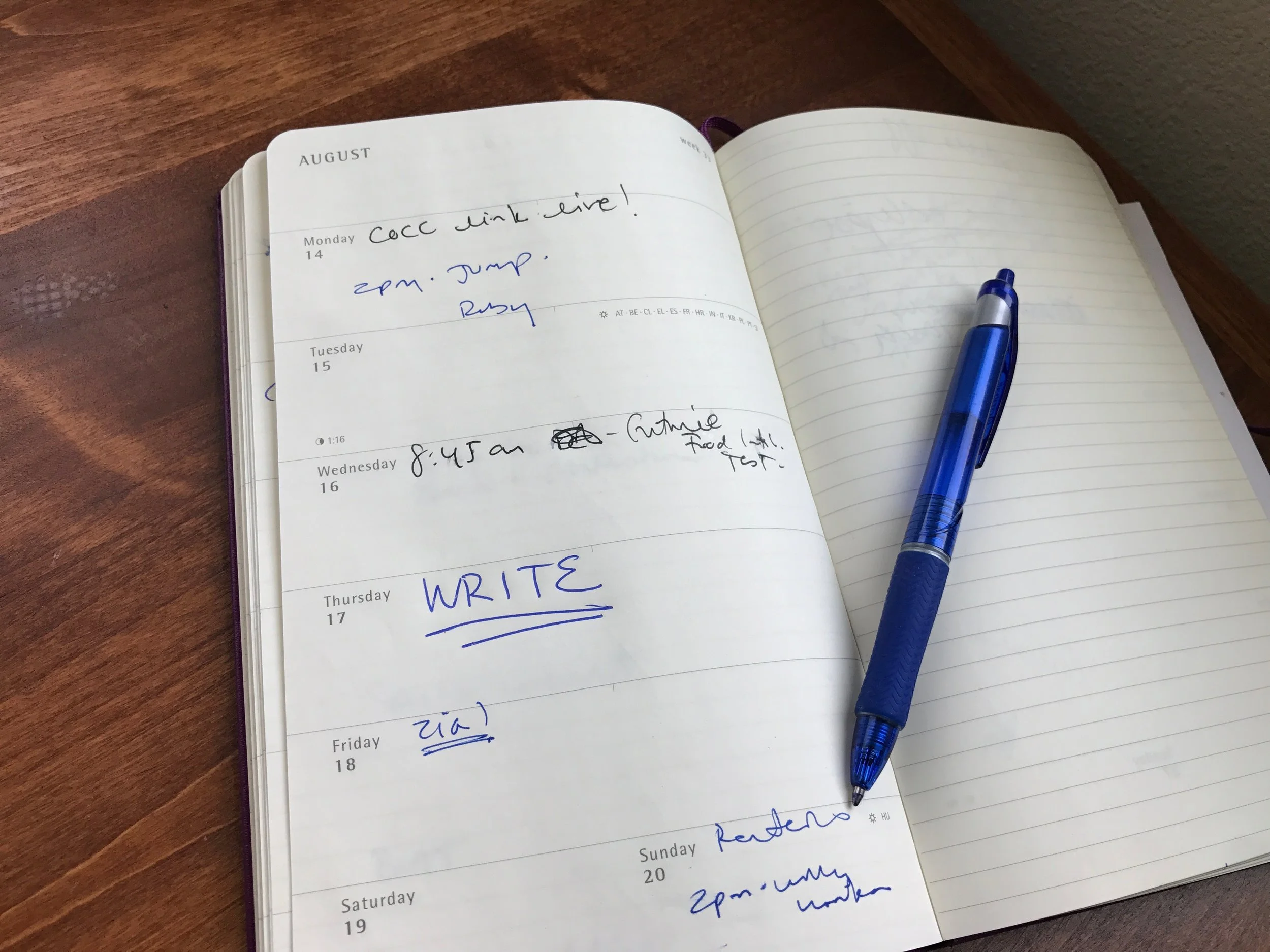Getting tossed away means not practicing. What tossed away looks like for me.
Author Terry Tempest Williams strikes a harmonious balance of writing deeply personal accounts of her life, while maintaining a sense of honor and respect to her loved ones.
Writing with Prompts:
Crafting Stories through the Side Door
Prompts encourage you to approach big topics in your writing - love, death, family, addiction, health - through "the side door." The resulting stories read fresh and wildly creative.
This fall join a 8-week writing group with local writer Sarah Cyr and learn the practice of writing with prompts. Each week you’ll find community and support through facilitated discussion and small group writing. Prompts given will encourage memoir/creative non-fiction writing.
“When I signed up for Sarah’s class, I had little motivation to be creative in my personal time and seemingly no time to write. I’ve now found a way to access my creativity again with an active writing practice. Sarah makes her students feel capable and connected to a larger community of writers." - Shelby
"Sarah's authenticity and commitment to this particular writing process remain with me as a beacon of hope in the messy, muddy process of birthing my own voice." - Chelsea
8 Monday Evenings
September 24-November 12
6:30-8:00 PM
Hawthorne Healing Arts, 39 NW Louisiana Drive (next to Troy Field in downtown Bend)
$185
***In honor of its 15th anniversary, 15% of the proceeds from this writing group will be donated to BendFilm.***
REGISTER BY CLICKING ADD TO CART BELOW.
8 week writing group beginning September 24, 2018.
Three Saturdays this spring from 1-4 PM at Hawthorn Healing Arts Center. Register for one, two or all three workshops. We’ll practice timed freewriting in response to prompts in each workshop, a style inspired by Natalie Goldberg.
Natalie Goldberg introduces the prompt I'm looking at or the variation what's in front of you in every one of her books on writing. Practicing this skill - writing what's visually around you - sets yourself up to use unique, specific detail in your prose. I keep this prompt in my back pocket and use it several times a week, particularly when I've scheduled myself time to write but feel ungrounded.
Thursday, 6:20 AM, for example. My head feels detached from my body. I am in my car. It is running. When I left the house, stars still blinked in the sky. I start to paint with words the way the barista is preparing to open the coffee shop on Newport Avenue in the darkness, his broad shouldered silhouette moving back and forth along the bar, the only light a fat Edison bulb in a square wooden lamp.
I see evidence of this prompt in use by authors I admire. Whether they are conscious of it or not, I don't know. Case in point:
An excerpt from Terry Tempest Williams' When Women Were Birds:
I am in jail because I was speeding, driving under a suspended license.
I am in jail because I didn't have the money to pay the fine.
I am in jail because one night can't be that bad.
I am in jail because part of me thinks I deserve to be.
INSIDE
Three sets of doors open and close behind me, then lock shut. I enter the women's pod, where twelve prisoners like myself are dressed in orange. It is a crowded room, with seven metal bunk beds; a toilet, sink, and shower; and four bolted-down tables with attached chairs that swing out from under them. The walls are cinder blocks painted white, with no windows, only fluorescent lights. The floor is covered with shiny linoleum squares.
-
Seems as though TTW asked for a pen and paper in her jail cell. Practice what I'm looking at // what's in front of me wherever you find yourself: car, prison, or otherwise.
Photo by Robert Hickerson on Unsplash
We study works of literature in every class I teach. Why? The careful examination of a book influences our own writing. "We breathe the inspiration of the author," says Natalie Goldberg about this process. Sensory detail, unique punctuation, thoughtful incorporation of research - we absorb all of this through a deep study of quality writing.
In October, students in the memoir writing class I'll teach this fall will share this type of deep study of the memoir Temperance Creek with the author herself. On October 12, Pamela Royes will read from her book. I'll provide writing prompts in response to the readings. We'll then write for ten minutes in response to each of the prompts. There'll also be time for a Q&A with Royes.
On nights when I jot a few ideas down in a notebook or listen to a Moth podcast before heading to sleep, I wake up the next morning with a writing frame of mind. Words form quickly and I face less resistance to write.
The feeling spills over into my day. I record a line of conversation I hear at a cafe. I note the empty wire shelves at my local hardware store, a sure sign of the culmination of summer and an image I want to weave into a poem that's slowly forming.
Writing begets writing. Do more of what cultivates writing in your life. Shed what doesn't.
What happens when we focus on commonplace objects in writing?
Some thoughts on keeping the pen hitting paper on a consistent basis.
Do you have a yearning to write but don't know where to start? Or maybe you already write but have trouble sticking with it? This workshop will help you gain the necessary tools to cultivate a consistent writing practice in your life.
This fall, find inspiration and structure in a class devoted to the practice of writing memoir.
Sometimes when I write I get this feeling that I know where I'm going. There's a momentum to tie things up in a bow. A pull toward closure or an answer. If I keep down this path, the piece would read like a Hollywood Blockbuster: predictable, formulaic. Spoon fed, boring.
Writing practice isn't easy to explain.
Share an excerpt of what you wrote during NaNoWriMo in a critique-free, celebratory environment or join us simply to listen to words writers in Central Oregon penned during the month of November as they tackled the goal of writing 50,000 words of a novel.
Read the November newsletter with information on upcoming programs and an insider look at what I'm reading.
I retrieved this creativity quote from an interview by Krista Tippett with the poet Naomi Shihab Nye.
Join me for a mini writing retreat this December and help raise funds for a child with severe medical needs in Central Oregon.
Over the course of six weeks, you'll be guided through the process of writing a personal essay from conception stage to final product.
Natalie Goldberg calls it monkey mind. Steven Pressfield labels it resistance. Elizabeth Gilbert describes it as fear. Regardless of the name, the concept is the same: it's the thing that stands in the way for so many of us wanting to accomplish a writing goal.
Writing is drawing the essence of what we know out of the shadows.




















